Master of Arts in Security and Intelligence Studies — Arlington
Northeastern Grad Student Puts Together Art Auction for Ukraine
Daria Koshkina, a Northeastern graduate student working toward her master’s degree in digital media with a concentration in 3D at the College of Professional Studies, curated an online auction, The Art Auction for Ukraine, in collaboration with Boston Cyberarts, Digital Silver Imaging and BarabásiLab at Northeastern.
The auction showcases artwork of Ukrainian artists and will benefit two non-profit organizations that provide humanitarian aid to Ukrainians.
What Fast Fashion Costs the World
Many clothing donations end up in an unexpected place — African landfills.
Elizabeth Cline, CPS master’s student in global studies and international relations and author of Overdressed: The Shockingly High Cost of Cheap Fashion, comments on fast fashion’s labor practices and advocates for a kind of conscious consumption that she says has been lacking for some time in the West’s relationship with its clothes.
The Shackles of the United Nations Security Council Veto, Explained
The Russian Federation is one of five nations that hold unilateral veto power on the U.N. Security Council–a group known as the “P5” that also includes the US, China, France, and the UK. Ukrainian President Volodymyr Zelenskyy and others argue that permanent members’ ability to obstruct resolutions has rendered the international organization irrelevant. Is it time to reform the veto power? CPS Associate Teaching Professor Fiona Creed, a U.N. scholar, explains this complex situation.
New Graduate Degree in Security and Intelligence
In an era of increased threats to our security, a new master’s degree program in a fast-growing professional field is set to give graduates the tools to anticipate and lead responses to security threats worldwide.
Designed to prepare students for leadership roles in the field of security and intelligence, the Master of Arts in Security and Intelligence Studies offers an interdisciplinary approach that merges security, law, politics, and constitutional rights to create well-rounded security leaders.
“Northeastern University has a long history of preparing individuals for leadership roles in the justice system,” said Faculty Director Jack McDevitt, professor of the practice in criminology and criminal justice and director of Northeastern’s Institute on Race and Justice. “We believe this new degree will be the strongest program yet to prepare security professionals to confront and respond to the increasingly complex challenges facing the United States and the world.”
In a challenging global security environment that is only becoming more complex, security and intelligence-related jobs are expected to expand much more rapidly than the average occupation, according to JobsEQ, a labor market research database. The new degree will equip learners with state-of-the-art training for security roles such as intelligence analyst, special agent, information security officer, corporate security specialist and manager, criminal investigator, or fraud investigator.
Taught by a faculty of security experts with long and diverse experience—including as constitutional lawyers, White House advisors, CIA operatives, military intelligence officers and more—the program will challenge students to gain and hone a broad array of skills through experiential learning as well as classroom and remote pedagogy. Among other critical competencies, participants will learn intelligence collection and dissemination, analysis, research, threat assessment, and evaluation of information and policy development, all while focusing on the importance of civil liberties in pursuing security in civil society.
Master’s candidates in the program will have the opportunity to choose among three concentrations: Strategic Intelligence & Analysis, Homeland Security & Emergency Management, and Corporate Security Management. As they explore a specialized course of study, areas of inquiry will include: the application of current leadership theory and managerial approaches to the security domain to ensure ethical business and strategic practices; the use of historical and contemporary references to explore issues related to homeland security efforts in the US; and the evaluation of key global regions to reveal unique threats and opportunities to interrupt them.
Also emphasized will be the role agencies at all levels of government, federal, state, local as well as the private sector play to prevent and respond to both human made and natural threats.
Students may begin enrolling in the Fall 2022 term.
CPS Students Win University Awards with Record Seven Named to Northeastern’s Huntington 100
College of Professional Studies students at every academic degree level – bachelor’s, master’s, and doctoral – were recognized this year with prestigious university awards for their extraordinary achievements and commitment to the values of Northeastern University.
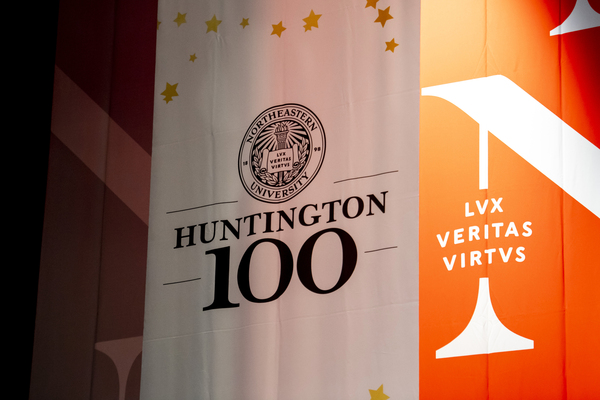
A record seven CPS students were named to the Huntington 100 this year, a group of students recognized for their service, leadership, innovation and entrepreneurship, global engagement, and impact on the campus community. These students are:
- Richa Dhungana, BS Finance and Accounting Management
- Lauren Herfindahl, BS Liberal Studies
- Brenda Hillman, Doctor of Education
- Laura Kozuszek, MS Global Studies and International Relations
- Mohammed (Mo) Moro, MS Global Studies and International Relations
- L’Bertrice Solomon, Doctor of Law and Policy
- Elif Yetistiren, BS Finance and Accounting Management
Distinguished juniors and seniors are selected by nomination into the Huntington 100 from all Northeastern campuses for achievements that embody “the university’s mission, ideals, and values”.
Lauren Herfindahl, CPS’22 was also the recipient of a Compass Award from Northeastern University Alumni Association. The award recognizes students from the senior class for “true dedication to a core set of values: leadership, volunteerism, academic integrity, and commitment to Northeastern.” Lauren, who’s looking to transition to the healthcare field, achieved academic success while working full-time as a professional dancer with the Boston Ballet and volunteering to mentor younger dancers. Each year, only nine awards are presented. David Fields, Interim Dean at the College of Professional Studies, described Lauren as “a disciplined, dedicated worker inside and outside of the classroom…precisely what it means to be a Northeastern University Husky.”
Out of more than 100 nominations received across award categories and Northeastern’s academic colleges, Digital Media student Raissa Talehata was honored with an Outstanding Graduate Student Award in Experiential Learning. This award is presented to graduate students “who have shown an extraordinary capacity to integrate academics and professional work and establish themselves as emerging leaders in their field.” As stated by her recommender, Raissa has “taken advantage of every opportunity for experiential learning, both curricular and co-curricular, during [her] course of study.”
Congratulations to all our awardees on their accomplishments!
From Kabul to Campus: Afghan Students Retrace Their Harrowing Journey to America
Lala Osmani, Mashal Aziz, Khadija Arian, and Sara Sherindil are newly arrived Afghan refugees to Northeastern’s Boston campus. They first met as finance and accounting majors at the American University in Afghanistan, the country’s first private university.
Through tears and laughter, they describe the pain of leaving family behind coupled with the joy of continuing their education at Northeastern’s College of Professional Studies.
Dawn of the Global Consensus Toolkit
Diplomacy meets equity as an interdisciplinary partnership yields a powerful new platform aimed at leveling the policy-making playing field.
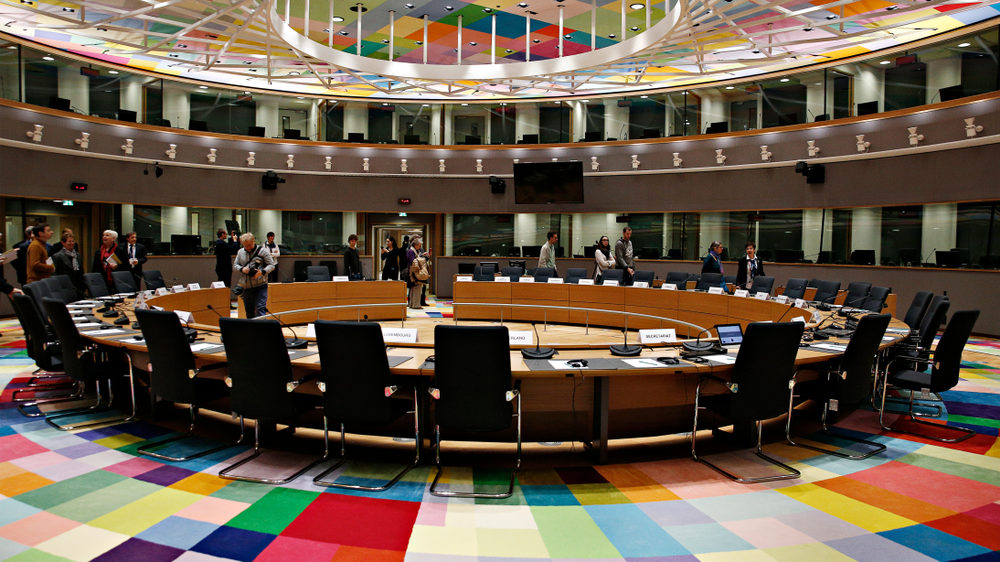
On its face, the request from the U.S. Department of State seemed simple: Design a digital dashboard to allow officials to quickly research how often United Nations (UN) member nations had sided with the U.S. on various topics. Wondering how often the votes of the U.S. and members of the G-77 have coincided on issues related to human rights? Nuclear arms and disarmament? Decolonization? Plug in the variables and find out.
In practice, it was anything but.
“From a policy perspective,” Associate Teaching Professor Fiona Creed says, “people often think there are a lot of possibilities, and there are. But then you add the data piece into it, and you realize—this may not be as straightforward as we think.”
It was the spring of 2020, and Creed had secured a project via the State Department’s Diplomacy Lab program, a public-private initiative wherein the federal agency partners with colleges and universities, outsourcing research and other tasks related to foreign policy challenges by offering student teams, led by faculty experts, the opportunity to wrestle with real-world problems.
For this particular project, the charge was to find a way to measure and visually render the degree to which members of the Group of 77 developing nations (a bloc that now numbers 134 and includes Cuba, Iran and Afghanistan) had voted in alignment with the U.S. Creed found the problem fascinating, and she knew her students in the College of Professional Studies’ Global Studies and International Relations graduate program would embrace the challenge.
She also knew they couldn’t do it alone.
The task was perfect for Creed’s students because it required researching, developing, and applying a sophisticated understanding of international relations to categorize UN resolutions and group them by topics and subtopics. But it also entailed logging the votes on each resolution, building digital dashboards, and figuring out the best ways to graphically render the decades of information contained in the UN voting history. Massive amounts of data were involved. The numbers would have to be crunched, the code written, and a design that would let users easily turn the figures into images such as bar graphs would have to be conceived and executed. All of it would take some serious expertise in programming and data analytics.
A long-awaited collaboration
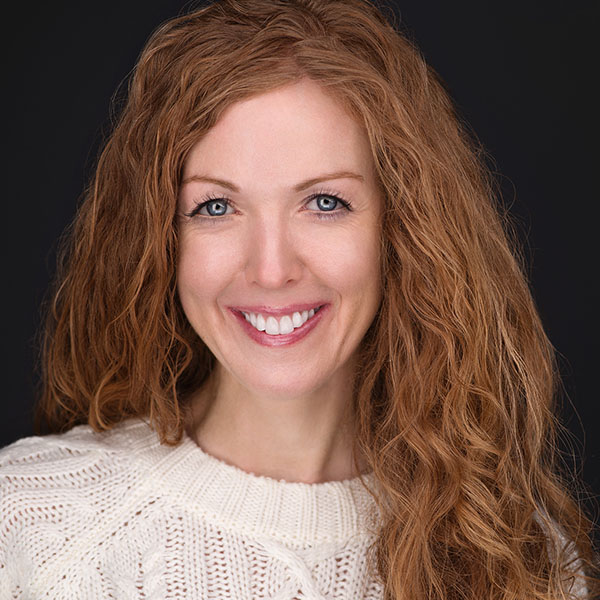
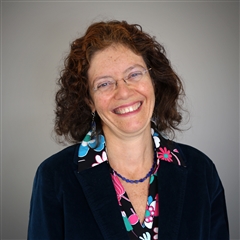
Luckily, Creed knew just whom to call—in fact, that person was sitting right across the hall.
“Alice is very good at explaining to me how the data works and what’s actually possible,” Creed says of her colleague and office neighbor Alice (pronounced ah-LEE-say) Mello, an assistant teaching professor in the Master of Professional Studies in Analytics program. The picture that emerges as the two describe working together is a kind of collaborative counterpoint, with Creed the visionary international affairs expert and Mello the technical miracle worker—and grounding voice of reason.
“I come in with big ideas,” Creed says. “‘This is amazing! We can definitely do this! Absolutely! Consider it done!’ And then Alice is right there saying ‘No, actually, that’s not going to work, because the data just won’t support it—but here’s what will work.’”
That synergy, rooted in shared experience and complementary expertise, has been years in the making.
Creed, whose career has encompassed research, diplomacy, entrepreneurship and the nonprofit sector, was born in Ireland and started her professional life as a policy analyst at the EU Delegation to the United Nations in New York City. She later served as executive director of the United Nations Association of Greater Boston, where she oversaw operations including Model UN, the Association’s flagship experiential learning program focused on diplomacy and global issues. For her PhD in European Studies at University College, Cork, Creed studied EU coordination at the UN.
Mello, born in Brazil, began her professional career as a programmer while still a student at the Federal University of Bahia in Salvador, Brazil. She went on to work as a software engineer for Coelba, the big utility that distributes power in Bahia state. She later developed database management applications for the Massachusetts Water Resource Authority, worked as a programmer at MIT and co-developed a technology-in-education consultancy. Her PhD from Tufts University is in Education, Technology, and Drama.
When the expatriates met at Northeastern, Mello says, they quickly found common ground, and before the Diplomacy Lab opportunity arose, they had long imagined working on a project together.
“I had a project with the UN in 2018,” Mello says, “and I approached Fiona about how we might make it sustainable, but we didn’t really end up pursuing it. Another time she asked me to present to students who needed data analytics on their projects. So we’ve had a few times that we’ve tried to work together, but nothing really went up. This time, it did.”
With students in their capstone classes and other courses onboard, the two educators launched the project. Soon, as global studies students sifted through thousands of UN resolutions, applying their knowledge of international affairs to categorize each, data analytics students began building the user dashboard and writing the code to generate a powerful, intuitive interface that would allow end-users to easily parse the information to suit their needs. As the students worked, their collaboration began to mirror that of their professors.
“One of the most interesting pieces for us was hearing the students interact,” Creed says. “The identification of the countries was becoming so fluent for the data analytics group that they were starting to notice things about the politics and to ask questions that the global studies students could answer. It was brilliant to see that come together.”
“For the analytics students it was super-interesting,” Mello adds, “because it’s basically getting qualitative data and transforming it into something quantitative. If it’s all quantitative, you punch in the numbers—and I’m not saying it’s easy—but you can do it. But to get qualitative data and then to transform that into quantitative, to look at patterns and have some basis for it statistically, that is where all the magic and the synergy came in.”
Inherent uncertainty
As students labored to build something new, part of the challenge became grappling with ambiguity. When you’re inventing something, it can be hard to know what success—or a good grade—will eventually look like. But learning to tolerate the uncertainty inherent in such a process, Creed and Mello say, actually helped students explore new modes of thinking.
“Working logically, analytically, but also understanding the process isn’t having all the answers, it’s figuring them out—I had never had that kind of thinking until I did my PhD,” Mello says. “But in this project, we tried to bring that to these students, because that’s the thinking that they need to do well to be good data scientists and good data analysts. It really resonated for me, to see them learning that way.”
Creed and Mello also note that, in some ways, the composition of the classes doing the work reflected the subject of the work itself.
“I had students from India, Ethiopia, a student based in Kuwait, and one in Qatar, who is in the U.S. military,” Creed says, “and then Alice’s group had students from China, India, and the U.S. When you’re looking at policy making and analyzing all of what was in front of us, it was really interesting to get the perspectives of students who were from the countries that they were working on and seeing patterns, or not seeing patterns, and then we could tease out afterwards with them, ‘What do you think of that?’ or ‘Why is that?’”
One of the most interesting developments, the researchers say, was the shift from a U.S. focus to a more global perspective. Engendered in conversation with their UN contacts, in the perspectives of students from diverse countries of origin, and through their own lenses as immigrants, that shift came to reflect the deepest mission of the portal that would eventually be known as the Global Consensus Toolkit.
“A primary motivation for having a public access portal,” Creed and Mello write in the introduction to the visual analytics platform they and their students developed, “is to level the policy-making playing field.”
“There was a lot of data,” Creed says. “We worked with it, Alice and I, plus multiple teams of students. There are many departments of foreign affairs or governments, globally, that just do not have the time or money to dedicate to getting into the UN digital library, downloading everything, coding it, reworking it—and so that’s where coming back to that original Diplomacy Lab ask, that we saw the relevance of this material being publicly available. And the usefulness of it.”
Big audience, broad applications
That usefulness, Creed and Mello say, reaches far beyond international affairs. Although the Toolkit was designed with diplomats in mind as the end-users, the information it contains—and the lenses it provides for sorting and analyzing that information—might easily be applied in the work of researchers, think tanks, nonprofits, advocacy groups and policy decision-makers or anyone else seeking to accurately chart the tides of power and the relationships among nations over the past 20 years.
From their “client,” the Global Consensus Toolkit earned rave reviews. When students presented at the State Department via Zoom, the reception was unequivocal. A senior UN official in attendance, Creed reports, was astonished.
“He said, ‘That is amazing. We have tried to work with this data before and we have never seen anything like that,’” Creed says. On the spot, he proposed a continued collaboration, one that would involve digging even deeper—and would not require a new application through the Diplomacy Lab program. With that project in mind, Mello and Creed plan to align their capstone classes this winter and next spring. For now, they are delighted to invite the world to use the free, online tool they and their students developed.
“Fiona told me in the beginning that nobody had done this work before,” Mello says. “There have been some static models of voting patterns, but we were able to create an interactive dashboard that is really functional—and that, nobody has done.”
A Pair of $7 Shoes Sparked Her Career Exposing the Real Cost of Fast Fashion
Journalist Elizabeth Cline, a sustainable fashion expert who’s long warned consumers about the high cost of fast fashion—the production of inexpensive, trendy clothes—enrolled at Northeastern when she decided that raising awareness isn’t enough.
The author, who’s in Northeastern’s global studies and international relations master’s program, has been on the forefront of the eco-conscious clothing movement since 2012 when she released her book “Overdressed: the shockingly high cost of fast fashion.”
Graduation 2021
College honors master’s and doctoral graduates, citing ‘ingenuity and resilience’, with ceremonies that emphasize service, perseverance and experiential learning.
Doctoral Hooding
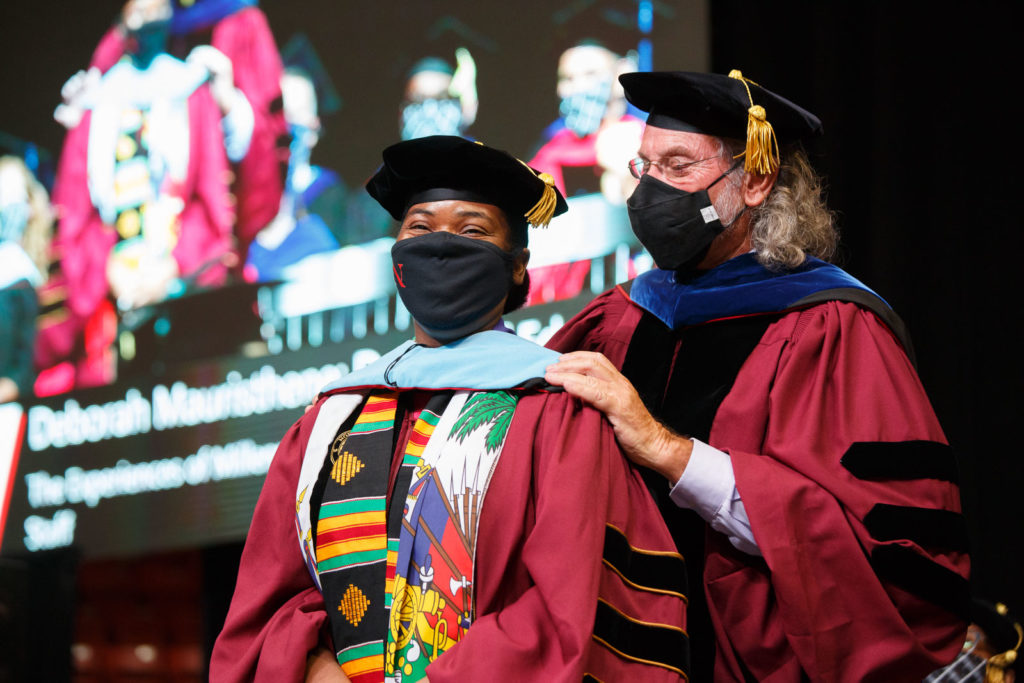
The words of Brent Musson, (Doctor of Law and Policy ’20), captured the mood at the Doctoral Hooding and Graduation Ceremony of the College of Professional Studies in Matthews Arena Sept. 9—and at the Master’s Graduation Ceremony in the same location the following day: “Humanity at its best,” the 2020 Dean’s Medal recipient said in his remarks to the successful doctoral candidates, “is humanity in gratitude.”
Gratitude was in abundance both days as faculty, administrators, students and their families—as well as friends of the College worldwide via livestream—celebrated the graduates’ achievements in the face of extraordinary challenges. Speakers at the ceremonies praised the degree recipients for their perseverance in scholarship despite a global pandemic, their passionate commitment to learning and their determination to address real-world problems in their project-based learning and research.
‘Both humility and pride’
In his opening remarks on Sept. 9, Provost and Senior Vice President for Academic Affairs David Madigan, Ph.D., welcomed the College of Professional Studies (CPS) community, expressed his faith in the graduates’ future success and his pride in their accomplishments and celebrated their membership in Northeastern’s “powerful knowledge network” dedicated to the dream of a more just and equitable society. He was followed at the podium by Interim Dean of CPS Dr. David Fields, who noted the unusual degree to which CPS students break down the barriers between work and learning.
“Our doctoral students are already fulltime professionals and leaders in their fields,” Dr. Fields observed. “In true Northeastern fashion, they are researching what they live, and living what they research, every day.”
Dr. Fields went on to explain the significance of the hooding ceremony—so-called because doctoral students traditionally have the hoods of their academic regalia lifted over their heads by faculty.
“The symbolism of the hooding ceremony at our doctoral commencement honors both the doctoral candidate’s work and the network of relationships that make that work possible,” Fields said. “[It] embodies both humility and pride, on both sides of the relationship, as faculty members welcome a new peer into their community.”
Faculty speaker Dr. Mounira Morris (B.S. ’91, M.S. ’95), assistant teaching professor and the co-lead for the Master of Education in Higher Education Administration program, offered her congratulations to the graduates and acknowledged the special challenges that had arisen during their studies, including the pandemic and the persistence of racial injustice. She quoted James Baldwin, noting his achievements as a playwright, novelist and civil rights activist: “Not everything that is faced can be changed, but nothing can be changed until it is faced.”
“To me,” Dr. Morris said, “this means that at times we will collectively endure hardship; however, we can use these experiences, especially as doctors, to offer wisdom, hope, and a better path forward.”
A longtime leader in diversity, equity and inclusion (DEI)—and currently working with colleagues at Northeastern to develop a new academic credential in DEI—Dr. Morris emphasized the power for good inherent in the attainment of an advanced degree, encouraging the graduates to find creative solutions to the challenges in their professions, communities and personal lives.
“We, as faculty,” she said, “ask that you take your research, and go out and change your world, your profession, your workplace and make it just a little bit better than before. We, as faculty, believe you can persevere and persist. We know you can.”
Intellectual explorers
Dr. Musson, whose acceptance of the 2020 Dean’s Medal had been previously postponed due to Covid-19 precautions, suggested in his remarks that the attitude of an academic researcher is “not that of an author or maker, but rather that of an explorer.” He praised the selflessness and commitment of his peers and made a critical distinction between an undergraduate education—which, he said, “teaches a student how to learn”—and a graduate education, in which students learn “to use tools … to solve other people’s problems” and to create value, going “from inward-facing to outward-facing.”
He noted that, soon after a doctoral candidate’s academic journey begins, “we become acutely aware of what we’re signing up for; to spend the next few years engaged in the most rigorous intellectual exercise of our lives, to extract a single, pure, tiny drop of insight to ever-so-slightly raise the sea level of the ocean of human knowledge.”
And he described a moment of inspiration in what he termed a spiritual awakening: a street soccer game he had observed in West Africa more than a decade earlier, where, when a beautiful goal was scored, both teams celebrated. Drawing a parallel between the players’ selfless joy and the academic community he had found at Northeastern, Dr. Musson said, “These happy boys had purpose; and that purpose made them work together, against all odds to orchestrate a moment of greatness—a moment of pure, unselfish greatness.
“I’ve never circled a soccer field making wings with my arms,” he continued, “but research has made me part of our team, and this humbling honor is our winning goal.”
As Dr. Musson finished his speech, the audience rose to deliver a sustained standing ovation.
At the conclusion of the ceremony, Dr. Madigan returned to the stage to offer closing remarks, praising the successful doctoral candidates for their “drive, dedication and sense of purpose.”
“The world is ever changing,” he said, “but you are prepared to meet—and conquer—its challenges.”
Master’s Ceremony
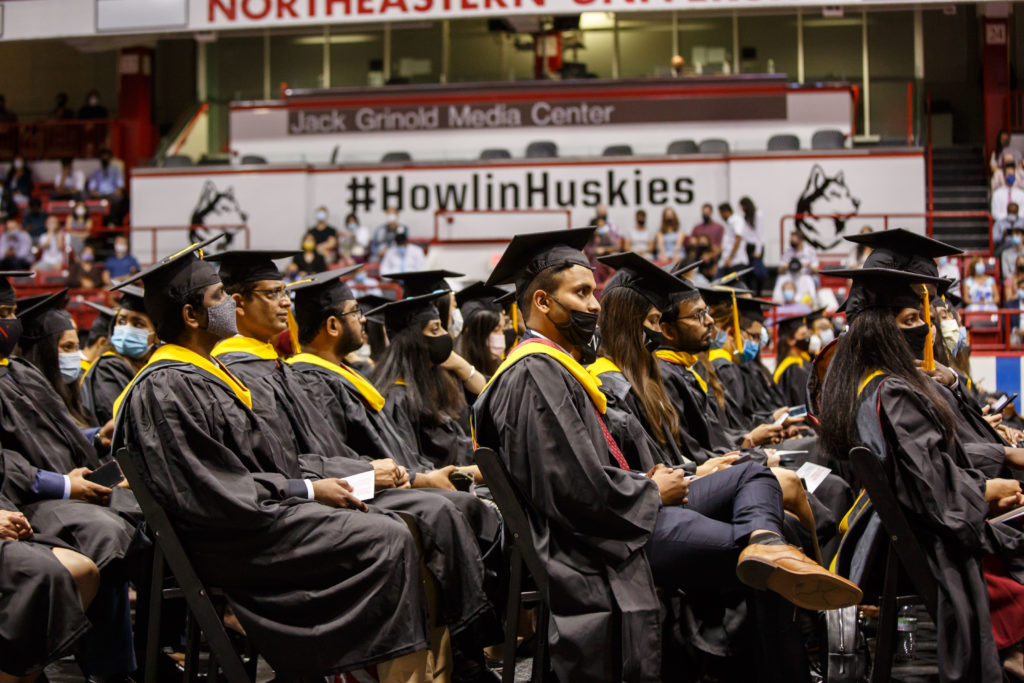
‘A day full of promise’
The following afternoon, Dr. Madigan returned to welcome master’s graduates to the arena on “a day full of promise.” He praised their “clear-eyed determination, discipline and hard work,” and offered special recognition to the faculty who, he said, by guiding the graduates to success, “have strengthened a legacy of knowledge and helped shape the future in scores of fields of professional endeavor.”
Following Dr. Madigan’s remarks, Dr. Fields spoke, celebrating the graduates’ global engagement and their cultivation of “the cultural competencies needed for a lifetime of contribution in a fast-paced, diverse, global society.” He went on to emphasize the benefits of their embrace of experiential learning, noting that in so doing, they had “addressed pressing, real-world problems” and become “well-prepared to lead from experience in the workplace.”
Dr. Fiona Creed, associate teaching professor and faculty director of the Global Studies and International Relations program, next introduced student speaker Ebony Small, ’21.
Reflecting on a year of adversity, Small observed “the pandemic itself could neither make nor break us” and asked graduates to consider the ways in which the challenges of the past 18 months had taught them to know their own courage, ambition, and steadfastness.
“We did not make it to this moment merely because we just-so-happened to survive a global pandemic,” Small said. “No, we made it here because we made the choice to value education and then fiercely pursued it. My dear friends and colleagues, despite the unexpected challenges of this year, we thrived. We grew. We changed.”
“This,” she concluded, “is what it looks like to turn a choice into a change. This is what it looks like to champion growth. Congratulations.”
From humble roots to world-renowned
Following an introduction by Dr. Earlene Avalon, associate professor and lead faculty for Health Administration and Health Sciences, graduation speaker Carl H. Whittaker, a philanthropist whose life path has spanned business, engineering and music, addressed the community.
A director of the Herb and Maxine Jacobs Foundation—which supports the College’s “A2M” or “Associates to Masters” program, offering an accelerated pathway from a community college associate’s degree to a bachelor’s at the College of Professional Studies and a master’s degree in Biotechnology at Northeastern’s College of Science—Whittaker began by invoking Northeastern’s origins as a vocational school offering evening classes, run by the YMCA.
“We all know that Northeastern is now a world-renowned university, highly ranked in many fields,” Whittaker said. “But inside this world-class institution is still the legacy of that 1898 night school.”
Whittaker linked this history with Northeastern’s emphasis on internship experiences, co-ops, and other programs that connect students to “great employers and great jobs.” He applauded the graduates for their effort and creativity in juggling jobs, families, and studies, urged them to embrace the role of mentor for other aspiring scholars, and invited them to fight income inequality—as his foundation does in part by supporting scholarships at Northeastern.
“I am inviting each of you to join my fight against economic inequality by encouraging at least one or two others to join you in earning an advanced degree,” Whittaker said. “Just be ready when you see a family member or neighbor who would value your guidance. Your friendly support might be thing that leads someone to a more prosperous and fulfilling life.”
The Doctoral Hooding and Master’s Ceremony were livestreamed from Matthews Arena. Click the links below to view recordings of the ceremonies.
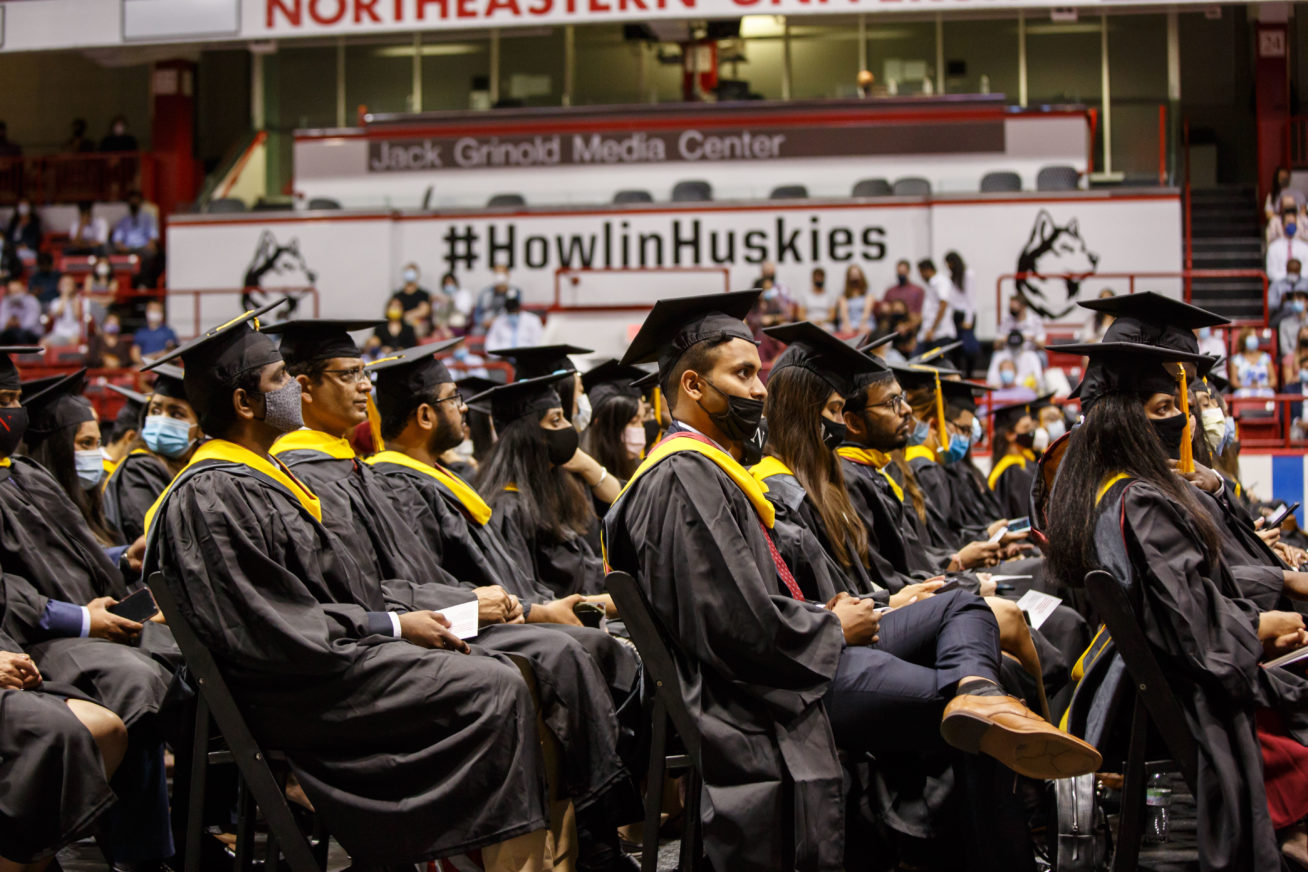
Watch the Ceremonies
The Doctoral Hooding and Master’s Ceremony were livestreamed from Matthews Arena. Click the links below to view the graduation pages and watch recordings of the ceremonies.